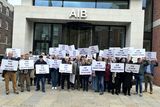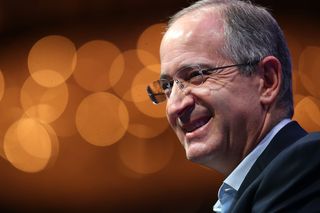Global slowdown is set to hit Ireland’s growth, Ibec warns
Lobby group wants extra government supports for energy costs
Ibec chief economist Gerard Brady
Fears of a global slowdown are filtering through to the Irish business community and business group Ibec warns that growth will fall sharply next year .
In its latest economic outlook, Ibec says consumers and companies are ”pressing pause” on spending and investment next year, as they feel the pinch.
Spiking energy costs, rising interest rates, bigger wage bills and new labour laws are all weighing on firms, who are nervous about waning growth in their main export markets.
“The Irish economy is at a turning point,” said Ibec chief economist Gerard Brady.
“For Ireland, as a small open economy, shifts in the flow of capital through the global economy and slowdowns in our major trading partners can have an outsized impact on our growth model.
“A lot of companies are looking at investments now, and they’re not cancelling them, but they are kind of pressing pause. They’re trying to see where the global market is going.”
While Ibec is upbeat on GDP growth this year, predicting a 7pc expansion – well above official forecasts – it says output will slow to 3.6pc in 2023.
Price rises are expected to average 7.5pc this year and 3.9pc next year.
Consumer sentiment is set to slow from 6.6pc in 2022 to 4pc next year, while domestic investment is expected to fall from 8.6pc to 3.7pc in 2023.
Mr Brady said that while there is “a chance” of a technical recession in the domestic economy – defined as two successive quarters of negative growth – it is still unlikely.
“Even if it mightn’t be a technical recession, you could see it feeling very much like a recession to businesses and workers across the economy. A lot of people would struggle.”
The International Monetary Fund this week downgraded its growth forecasts on the back of stalling growth in the US, UK, China and the eurozone, particularly Germany, as a result of the Ukraine war and the pandemic.
The biggest risks to the Irish economy are central banks hiking rates too far and too fast, hammering global growth, and a cut-off in Russian energy supplies to Europe, which would spill over to prices here.
In Ireland, spiralling construction costs and new labour laws are putting added pressure on firms, affecting “our competitive position”, Mr Brady said.
Ibec is calling for extra government supports to deal with rising energy costs and changes to pension enrolment, sick pay, the living wage and other employment rules.
“All of it is coming at once,” Mr Brady said. “And it’s coming at once into a very difficult period that we’re just out of and another difficult period we’re coming into.”
Join the Irish Independent WhatsApp channel
Stay up to date with all the latest news














